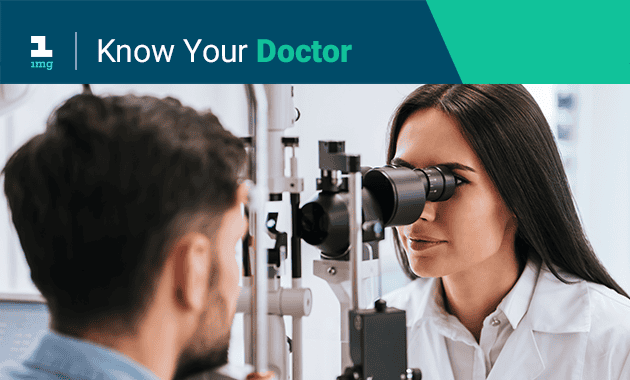
An ophthalmologist or an optician? Who do you visit to get your routine eye check-up? If your answer is an optician, you have to read this article without fail.
Most people tend to go to an optician to get an eye examination done and to get their prescription glasses and not at a doctor’s clinic. This is completely WRONG because opticians might only be able to help you figure out what kind of glasses you need but not be able to diagnose and treat other vision related problems. In fact, many doctors encourage you to even bring your glasses and lenses to their clinic after you get it from the optician so they can check whether it is accurate.
As most people are unaware of the right eye specialist to go, in this series of know your doctor, we will be explaining about the types of eye specialists.
Click Here To Visit Our Eye Care Store.
1. Optician
Opticians are not eye specialists or doctors and hence, can’t do eye examinations, prescribe glasses or treat eye problems. They are eye care professionals, who are qualified to provide, fit and repair eyeglasses, contact lenses, and frames. They:
-Take facial measurements for glasses.
-Fill the prescription provided by an eye specialist.
-Check lens prescriptions.
-Help you decide the type of lenses and frames.
2. Ophthalmologist
Ophthalmologists are eye specialists who specialize in eye and vision care. They diagnose and treat all eye diseases, perform eye surgeries and prescribes glasses or lenses to correct vision problems. You can consult an ophthalmologist for eye disorders such as:
-Glaucoma
-Refractive errors
-Iritis
-Conjunctivitis
-Burns
-Cataract
-Dry eyes
-Stye
-Eye floaters
-Eye injury
-Crossed eyes
-Droopy eyelids
-Squint
-Strabismus
-Vision loss
-Macular degeneration
-Diabetic retinopathy
-Eye cancer
– And many other eye problems
If your ophthalmologist feels that you require specific care or treatment for your eye problem, he might recommend you to a subspecialist. The common types of subspecialists of ophthalmologists include:
– Cornea specialist can help in dealing with diseases that affect the cornea (a transparent layer that covers the front of the eye). They also perform refractive surgery (such as LASIK), and corneal transplant.
– Retina specialist is the one who diagnoses, treats and manages retinal diseases such as macular degeneration or diabetic retinopathy.
– Glaucoma specialist helps in the diagnosis and management of glaucoma with the use of medicine, laser, and surgery. Glaucoma is a condition that damages optic nerve in the eye due to excessive pressure buildup in the eye and can lead to loss of vision.
– Pediatric specialist, also known as a pediatric ophthalmologist, diagnose and treat eye problems in infants and children. This includes conditions such as misalignment of the eye, refractive errors, vision difference in both the eyes, strabismus, squint and other childhood eye diseases.
– Neuro-ophthalmologists are eye specialists who are trained to diagnose and treat eye problems due to nerve or muscle disorders. The common conditions they treat include optic nerve problems, double vision, eyelid abnormalities, unequal pupil size, squint, abnormal eye movements and vision loss.
– Oculoplastic surgeon is the one who can treat problems with the eyelids and areas around the eyeball. As the name suggests, they can also help improve facial features with the help of injections and surgeries.
**Consult India’s best doctors here**
3. Optometrist
Optometrists are eye care professionals who can assist an ophthalmologist. They can prescribe corrective lenses for vision problems but can’t prescribe medicines or perform eye surgery. Optometrists are trained to:
-Determine the clarity of vision (visual acuity).
-Diagnose vision problems (nearsightedness, farsightedness, presbyopia, and astigmatism).
-Test the ability to focus and coordinate the eyes.
-Test the ability to see colours accurately.
-Prescribe eyeglasses and contact lens.
The bottom line is, if you are planning to get your eyes checked, then make sure you consult the right eye specialist.
With inputs from Dr. Sanjiv Gupta, Director & Sr. Eye Surgeon, I Care Centre, Delhi.
(The article is reviewed by Dr. Shilpa Garcha, General Physician)
Recommended Reads:
6 Foods To Have For A Healthy Eyesight
Eye Strain? Try These Effective Tips To Protect Your Eyes
References:
Ophthalmology Subspecialities. Tips & Prevention. Eye Health. American Academy Of Ophthalmology.